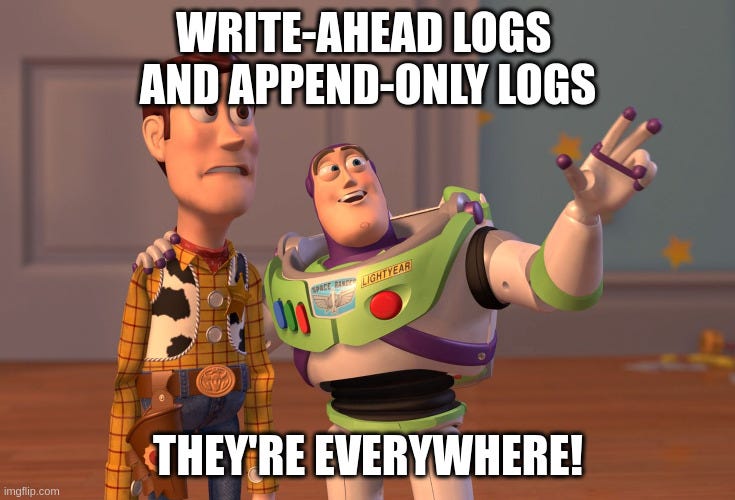The Write-Ahead Log: The underrated Reliability Foundation for Databases and Distributed systems
I want to talk with you today about the Write-Ahead Log concept. Why? Last month, I gave the “PostgreSQL Superpowers” talk again twice at .NET meetups. And I had random thoughts on databases and .NET developers:
Some of those are inherently related to the Microsoft community (preferences for MS tooling), but the rest align with the general state of the art. Of course, those observations are anecdotal evidence, but I noticed that in multiple places and countries, so I think that they’re close to the point. The observations were a bit disappointing, but I don’t want to complain; I want to be proactive and help you and your colleagues improve. Step by step. Today, let’s take the first step to close the knowledge of one of the most underrated concepts in distributed systems and databases: Write-Ahead Log. The Challenge: ReliabilityDistributed systems, databases, and message brokers must manage the state reliably. The challenge remains whether you’re dealing with PostgreSQL, Kafka, or MongoDB. You must ensure a system can recover from crashes, maintain durability, and replicate changes efficiently without compromising performance. State management in such systems is filled with complexities—updates can fail midway, nodes can crash unexpectedly, and networks can introduce delays or partitioning. In a nutshell: Fallacies of distributed computing. To tackle these challenges, most reliable systems rely on Write-Ahead Logs (WALs). The idea is straightforward but essential: you never make a change directly; instead, you first append the change to a durable log. This guarantees that no matter what happens, the system can always recover or replicate its state. In this article, we’ll explore the core principles behind the Write-Ahead Log. We’ll explain why the WAL is indispensable, how it solves problems like durability, consistency, and replication, and how its implementation differs across PostgreSQL, Kafka, and MongoDB. Yes, all of those different tools use it! What is a Write-Ahead Log (WAL)?A write-ahead log follows a basic principle: before applying any changes to the main data store, the system writes the changes to an append-only log. The log serves as a sequential, persistent record of every operation. If the system crashes midway through applying a change, the WAL can be replayed to restore the system to a consistent state. Imagine a database table where a row is being updated. Without a WAL, the database might overwrite the row in the main storage. If the server crashes halfway through writing the new data during this operation, the old and the new data could be corrupted, leaving the system in an inconsistent state. The update is neither “committed” nor safely recoverable. The WAL solves this by ensuring the following sequence of events:
This mechanism guarantees two critical things:
The write-ahead log is at the core of modern systems because it satisfies critical properties for ACID transactions, replication, and fault tolerance. It allows systems to trade off complexity in favour of simplicity—sequential appends are far easier, faster, and more reliable than attempting scattered random writes directly to a data store. For example, imagine this process in practice with a database: Step 1: A user transaction updates the balance column of a user’s table. The system writes a WAL entry like this: This entry is appended to the WAL file and flushed to disk. Each operation can gather a different set of metadata (update will be different than insert or delete). Step 2: The system updates the users table in its data files. If this step is interrupted (e.g., due to a power outage), the log ensures that step 1 is already durable. Step 3: On recovery, the system reads the WAL file, identifies uncommitted changes (like transaction 123), and reapplies them to the table. Each entry has its monotonic offset. Thanks to that, the WAL Processor can keep the position of the last handled offset and know which entries have not yet been processed. Why Write-Ahead Logs Are EverywhereWrite-ahead logs solve some of the hardest and most fundamental problems in systems that manage state. Their ubiquity in modern databases, messaging systems, and distributed systems is no coincidence. Let’s unpack the reasons why WALs are essential: 1. DurabilityDurability ensures that once a system acknowledges a change, that change will persist—even in the face of crashes or failures. WALs make this possible by first appending changes to a persistent log. Because appends are sequential writes, they are faster and less prone to data corruption than scattered random writes. For example, in PostgreSQL, the system will not acknowledge a transaction as “committed” until the corresponding WAL entry is safely flushed to disk. This guarantees that no committed transaction will ever be lost, even if the server crashes. 2. Crash RecoverySystems can fail at any point—hardware faults, software bugs, power outages, you name it. A crash could leave the system in an inconsistent state without a reliable recovery mechanism. By writing changes to the WAL before applying them, systems can recover gracefully:
This approach allows systems to recover within seconds, even after catastrophic failures. 3. ReplicationReplication is the process of propagating changes from one system to another, often for high availability, fault tolerance, or read scalability. Logs are the perfect tool for replication because they provide a linear, ordered history of changes. Replicas can replay the WAL to stay in sync with the primary system. In MongoDB, for instance, the oplog (from operations log - MongoDB’s version of the WAL) propagates changes from the primary node to the secondary nodes. The same happens in PostgreSQL replication. 4. Performance and EfficiencyAppending to a log is far more efficient than making scattered random writes to a database. Storage systems—whether spinning disks or SSDs—are optimized for sequential writes. The WAL takes advantage of this by batching and appending changes, resulting in:
Let’s discuss a few examples of using Write-Ahead Log in different systems: PostgreSQL, Kafka and MongoDB... Continue reading this post for free in the Substack app |
Older messages
Applying Observability: From Strategy to Practice with Hazel Weakly
Monday, December 2, 2024
Have you considered applying observability but struggled to match the strategy with the tooling? Or maybe you were lost on how to do it? I have something for you!I had a great discussion with Hazel
Get full 30-day access to all Architecture Weekly content for free
Friday, November 29, 2024
Hey! Thank you for being a subscriber; that's much appreciated. ͏ ͏ ͏ ͏ ͏ ͏ ͏ ͏ ͏ ͏ ͏ ͏ ͏ ͏ ͏ ͏ ͏ ͏ ͏ ͏ ͏ ͏ ͏ ͏ ͏ ͏ ͏ ͏ ͏ ͏ ͏ ͏ ͏ ͏ ͏ ͏ ͏ ͏ ͏ ͏ ͏ ͏ ͏ ͏ ͏ ͏ ͏ ͏ ͏ ͏ ͏ ͏ ͏ ͏ ͏ ͏ ͏ ͏ ͏ ͏ ͏ ͏ ͏ ͏ ͏ ͏ ͏
Deduplication in Distributed Systems: Myths, Realities, and Practical Solutions
Monday, November 25, 2024
This week, we'll discuss the deduplication strategies. We'll see whether they're useful and consider scenarios where you may need them. We'll also do a reality check with the promises
Ordering, Grouping and Consistency in Messaging systems
Monday, November 18, 2024
We went quite far from our Queue Broker series in recent editions, but today, we're back to it! By powers combined, I joined our Queue Broker implementation to solve the generic idempotency check
Building your own Ledger Database
Monday, November 11, 2024
Today we discussed a challenge of replacing Amazon Quantum Ledger Database raised by Architecture Weekly community member. The surprising recommendation was to built your own Ledger Database. Why? Am I
You Might Also Like
Data Science Weekly - Issue 588
Thursday, February 27, 2025
Curated news, articles and jobs related to Data Science, AI, & Machine Learning ͏ ͏ ͏ ͏ ͏ ͏ ͏ ͏ ͏ ͏ ͏ ͏ ͏ ͏ ͏ ͏ ͏ ͏ ͏ ͏ ͏ ͏ ͏ ͏ ͏ ͏ ͏ ͏ ͏ ͏ ͏ ͏ ͏ ͏ ͏ ͏ ͏ ͏ ͏ ͏ ͏ ͏ ͏ ͏ ͏ ͏ ͏ ͏ ͏ ͏ ͏ ͏ ͏ ͏ ͏ ͏ ͏ ͏ ͏
💎 Issue 458 - Why Ruby on Rails still matters
Thursday, February 27, 2025
This week's Awesome Ruby Newsletter Read this email on the Web The Awesome Ruby Newsletter Issue » 458 Release Date Feb 27, 2025 Your weekly report of the most popular Ruby news, articles and
📱 Issue 452 - Three questions about Apple, encryption, and the U.K
Thursday, February 27, 2025
This week's Awesome iOS Weekly Read this email on the Web The Awesome iOS Weekly Issue » 452 Release Date Feb 27, 2025 Your weekly report of the most popular iOS news, articles and projects Popular
💻 Issue 451 - .NET 10 Preview 1 is now available!
Thursday, February 27, 2025
This week's Awesome .NET Weekly Read this email on the Web The Awesome .NET Weekly Issue » 451 Release Date Feb 27, 2025 Your weekly report of the most popular .NET news, articles and projects
💻 Issue 458 - Full Stack Security Essentials: Preventing CSRF, Clickjacking, and Ensuring Content Integrity in JavaScript
Thursday, February 27, 2025
This week's Awesome Node.js Weekly Read this email on the Web The Awesome Node.js Weekly Issue » 458 Release Date Feb 27, 2025 Your weekly report of the most popular Node.js news, articles and
💻 Issue 458 - TypeScript types can run DOOM
Thursday, February 27, 2025
This week's Awesome JavaScript Weekly Read this email on the Web The Awesome JavaScript Weekly Issue » 458 Release Date Feb 27, 2025 Your weekly report of the most popular JavaScript news, articles
💻 Issue 453 - Linus Torvalds Clearly Lays Out Linux Maintainer Roles Around Rust Code
Thursday, February 27, 2025
This week's Awesome Rust Weekly Read this email on the Web The Awesome Rust Weekly Issue » 453 Release Date Feb 27, 2025 Your weekly report of the most popular Rust news, articles and projects
💻 Issue 376 - Top 10 React Libraries/Frameworks for 2025 🚀
Thursday, February 27, 2025
This week's Awesome React Weekly Read this email on the Web The Awesome React Weekly Issue » 376 Release Date Feb 27, 2025 Your weekly report of the most popular React news, articles and projects
February 27th 2025
Thursday, February 27, 2025
Curated news all about PHP. Here's the latest edition Is this email not displaying correctly? View it in your browser. PHP Weekly 27th February 2025 Hi everyone, Laravel 12 is finally released, and
📱 Issue 455 - How Swift's server support powers Things Cloud
Thursday, February 27, 2025
This week's Awesome Swift Weekly Read this email on the Web The Awesome Swift Weekly Issue » 455 Release Date Feb 27, 2025 Your weekly report of the most popular Swift news, articles and projects

